Text
Bullet Journaling: a masterpost.
Bullet Journal Things ♡
inspiration/ideas:
⁃ constellation chart
⁃ cute quotes/doodles
⁃ stress management pages
⁃ use brown paper bags ripped out for doodles
⁃ cut out things from magazines/paper bags
⁃ order stickers
⁃ washi tape EVERYTHING
⁃ order black pens
⁃ use markers
⁃ work on cursive
⁃ idea/random thought pages
⁃ picture pages
⁃ books to read
⁃ movies/shows to watch
⁃ daily reminders
⁃ habit trackers
⁃ thoughtful pages (philosophy, science, book reviews, etc.)
⁃ bookmarks
⁃ websites
⁃ start a blog/continue studyblr
⁃ songs/albums to hear
⁃ messy/creative spreads
⁃ pastels (esp. pink)
⁃ doodle banners/headers/fillers
⁃ rant pages
⁃ order a watercolour palette
⁃ advice/how-to pages (how to become a morning person)
⁃ travel pages
⁃ dream journal pages
⁃ use song lyrics
⁃ poetry pages
⁃ astronomy
⁃ yearly spread
⁃ new years resolution
⁃ mini monthly calendars
⁃ birthdays
⁃ spending chart
⁃ receipt pockets
⁃ health pages
⁃ decor/interior decorating/dream house pages
⁃ coffee tracker
⁃ water tracker
⁃ lipstick kisses
⁃ sticky notes
⁃ handwriting samples
⁃ paint swatches
⁃ wish lists (swell water bottle, more notebooks, black pens, phone adapter, etc.)
⁃ passwords
⁃ gift ideas
⁃ shopping lists
⁃ recipes
⁃ trip ideas
⁃ self care
⁃ ticket stubs
⁃ dried/pressed flower petals
⁃ weather
⁃ paintings (The Swing)
⁃ colour schemes
⁃ words (darling, daydreaming, celestial, astral, entropic, enigmatic, paradoxical, etc.)
⁃ themes lists (The Swing, coffeehouse, forest, ocean, London, yellow, space, inferno, candide, the odyssey, etc.)
⁃ construction paper
⁃ get pictures developed
⁃ order more picture corners
⁃ dictionary pages
⁃ buy scrapbook pages
Things to put in your journal:
http://studywithinspo.tumblr.com/post/153622119945/112416-pretty-in-pink-in-a-thanksgiving
http://lostlxmb.tumblr.com/post/153478048392/nov-21-2016-its-finally-thanksgiving-break
http://acadaemic.tumblr.com/post/153572080605/super-pink-super-soft-spread-from-last-week
https://studyfulltime.tumblr.com/post/153917313189/112-this-month-and-this-weekim-trying-something
http://journalsanctuary.tumblr.com/post/152787633563/doodle-ideas-1-plants-remember-when-i-asked-you
http://journalsanctuary.tumblr.com/post/154391532418/lettering-tips-i-did-a-thing-d-its-been-ages
Even More Things To Add To Your Bullet Journal
http://nag-aaral.tumblr.com/post/154970947270/week-51-important-life-decisions-made-and-im
http://studyrose.tumblr.com/post/154472885699/i-really-really-like-the-way-my-spread-is-shaping
https://gooseapartment.tumblr.com/post/152800191105/06112016-the-way-to-you-becomes-a-flower-path
http://journalsanctuary.tumblr.com/post/154593004978/december-17-2016-ive-decided-to-take-a-break
Page Ideas for My Bullet Journal
ideas for bullet journal spreads
http://time-to-get-focused.tumblr.com/post/137187238739/ta-da-my-banner-page-is-complete-so-stoked
Bullet Journal page ideas for 2016
http://alicesbulletjournal.tumblr.com/post/153361332097/bullet-journal-page-dividers
http://brighterplaces.tumblr.com/post/149837586299/september-plan-with-me-i-tried-using-washi-tapes
http://haleystudies.tumblr.com/post/138512058801/cute-lil-bullet-journal-page
http://lillstudies.tumblr.com/post/151712672576/my-first-ever-bullet-journal-page-ive-started-in
http://lnkstones.tumblr.com/post/142433450475/bullet-journal-page-ideas-page-4
http://please-justletmepass.tumblr.com/post/136362433981/bullet-journal-my-motivation-page-can-you
bullet journal pages
http://allcutified.tumblr.com/post/155114756855/so-2016-will-last-only-a-few-days-and-now-im
ideas for bullet journal spreads
http://studywithinspo.tumblr.com/post/153441714765/the-evolution-of-my-bullet-journal-in-seven
Things to put in your journal:
http://lostlxmb.tumblr.com/post/153478048392/nov-21-2016-its-finally-thanksgiving-break
http://icecreamandcereal.tumblr.com/post/153688759561/bullet-journal-essentials
http://lycheestudy.tumblr.com/post/154048502593/120416-starting-a-new-bullet-journal-in-a
http://literahti.tumblr.com/post/154322031662/11122016-working-on-my-bullet-journal-for
http://bulletsjournal.tumblr.com/post/154354045442/doodles-x-printables-x-dailyweeklymonthly
http://studykouffee.tumblr.com/post/154630879928/181216-a-spread-just-for-christmas-ꈍ-ꈍ
http://baby-gloom.tumblr.com/post/154168911959/recent-planner-pages-to-read-to-watch-food-log
http://studyrose.tumblr.com/post/155108970349/my-bullet-journal-flip-through-video-is-live-go
http://studyguideverified.tumblr.com/post/155017107099/ina-studies-just-in-case-this-helps-anyone-go
http://studyjewel.tumblr.com/post/155108890727/holocrams-12-19-17-little-journal-plant
http://biiostudy.tumblr.com/post/155318626406/reviseordie-how-to-illustrate-your-notes-if-this
Bullet journal quotes part II
Celebrate every tiny victory
Pages for your 2017 bujo
http://academiix.tumblr.com/post/155368727211/3100-productivity-days-saw-this-lovely-spread
Things to put in your journal:
http://studyguideverified.tumblr.com/post/155636706994/thearialligraphyproject-weve-talked-about-how
http://acadehmic.tumblr.com/post/155876681082/acadehmic-hey-everyone-its-about-time-i-made
12K notes
·
View notes
Text
How to Study Like a Harvard Student
Taken from Sophia Chua-Rubenfeld, daughter of the Tiger Mother
Preliminary Steps
1. Choose classes that interest you. That way studying doesn’t feel like slave labor. If you don’t want to learn, then I can’t help you.
2. Make some friends. See steps 12, 13, 23, 24.
General Principles
3. Study less, but study better.
4. Avoid Autopilot Brain at all costs.
5. Vague is bad. Vague is a waste of your time.
6. Write it down.
7. Suck it up, buckle down, get it done.
Plan of Attack Phase I: Class
8. Show up. Everything will make a lot more sense that way, and you will save yourself a lot of time in the long run.
9. Take notes by hand. I don’t know the science behind it, but doing anything by hand is a way of carving it into your memory. Also, if you get bored you will doodle, which is still a thousand times better than ending up on stumbleupon or something.
Phase II: Study Time
10. Get out of the library. The sheer fact of being in a library doesn’t fill you with knowledge. Eight hours of Facebooking in the library is still eight hours of Facebooking. Also, people who bring food and blankets to the library and just stay there during finals week start to smell weird. Go home and bathe. You can quiz yourself while you wash your hair.
11. Do a little every day, but don’t let it be your whole day. “This afternoon, I will read a chapter of something and do half a problem set. Then, I will watch an episode of South Park and go to the gym” ALWAYS BEATS “Starting right now, I am going to read as much as I possibly can…oh wow, now it’s midnight, I’m on page five, and my room reeks of ramen and dysfunction.”
12. Give yourself incentive. There’s nothing worse than a gaping abyss of study time. If you know you’re going out in six hours, you’re more likely to get something done.
13. Allow friends to confiscate your phone when they catch you playing Angry Birds. Oh and if you think you need a break, you probably don’t.
Phase III: Assignments
14. Stop highlighting. Underlining is supposed to keep you focused, but it’s actually a one-way ticket to Autopilot Brain. You zone out, look down, and suddenly you have five pages of neon green that you don’t remember reading. Write notes in the margins instead.
15. Do all your own work. You get nothing out of copying a problem set. It’s also shady.
16. Read as much as you can. No way around it. Stop trying to cheat with Sparknotes.
17. Be a smart reader, not a robot. Ask yourself: What is the author trying to prove? What is the logical progression of the argument? You can usually answer these questions by reading the introduction and conclusion of every chapter. Then, pick any two examples/anecdotes and commit them to memory (write them down). They will help you reconstruct the author’s argument later on.
18. Don’t read everything, but understand everything that you read. Better to have a deep understanding of a limited amount of material, than to have a vague understanding of an entire course. Once again: Vague is bad. Vague is a waste of your time.
19. Bullet points. For essays, summarizing, everything.
Phase IV: Reading Period (Review Week)
20. Once again: do not move into the library. Eat, sleep, and bathe.
21. If you don’t understand it, it will definitely be on the exam. Solution: textbooks; the internet.
22. Do all the practice problems. This one is totally tiger mom.
23. People are often contemptuous of rote learning. Newsflash: even at great intellectual bastions like Harvard, you will be required to memorize formulas, names and dates. To memorize effectively: stop reading your list over and over again. It doesn’t work. Say it out loud, write it down. Remember how you made friends? Have them quiz you, then return the favor.
24. Again with the friends: ask them to listen while you explain a difficult concept to them. This forces you to articulate your understanding. Remember, vague is bad.
25. Go for the big picture. Try to figure out where a specific concept fits into the course as a whole. This will help you tap into Big Themes – every class has Big Themes – which will streamline what you need to know. You can learn a million facts, but until you understand how they fit together, you’re missing the point.
Phase V: Exam Day
26. Crush exam. Get A.
238K notes
·
View notes
Photo

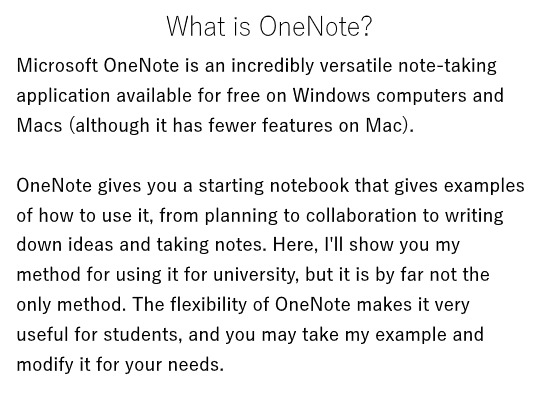
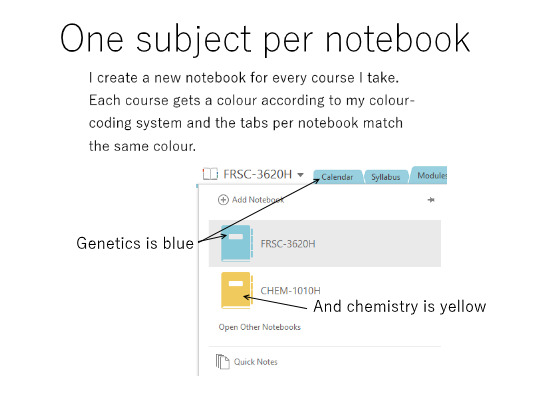
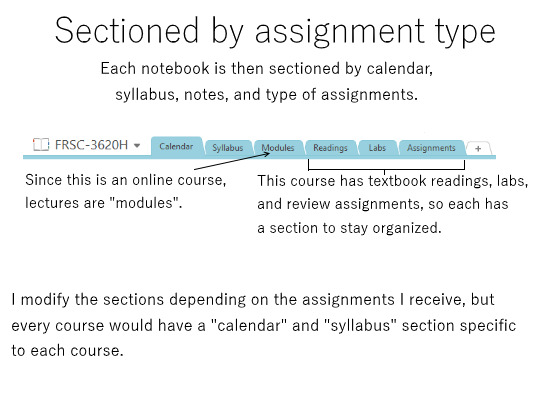
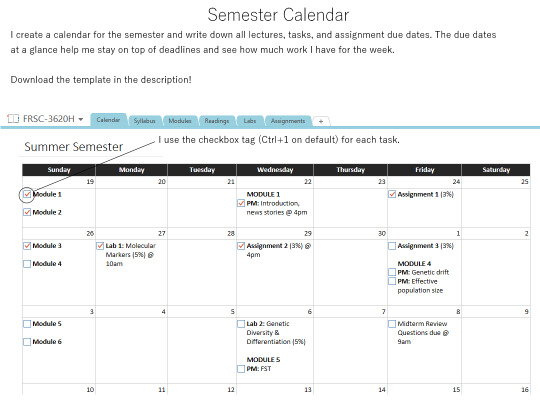

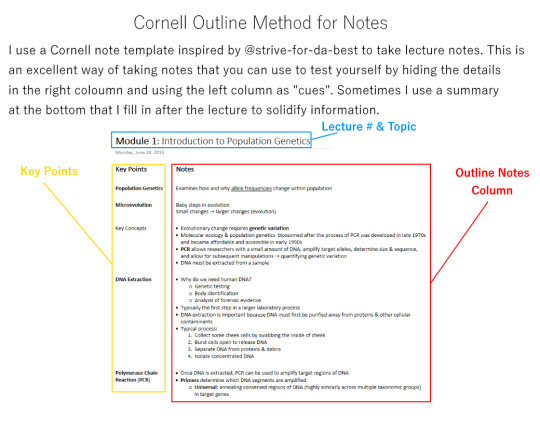
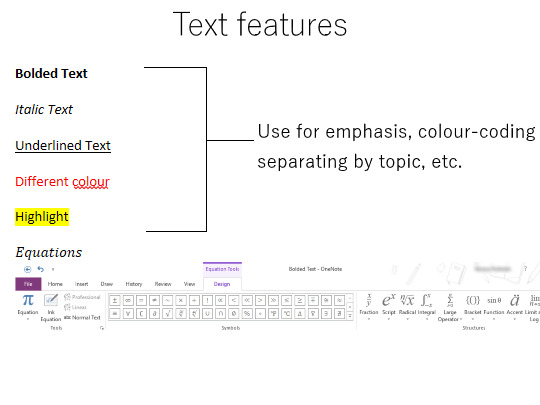
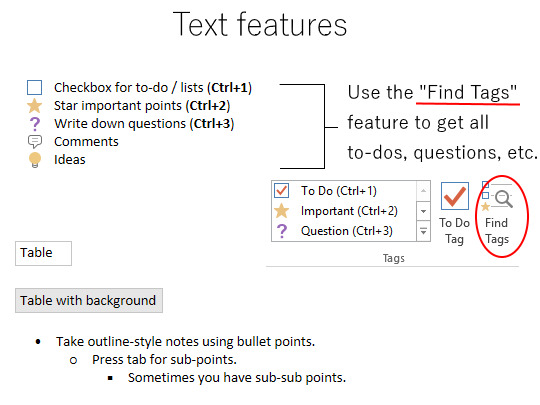
How I Use OneNote for University
Hey, all! I thought I’d share how I use OneNote, for any students who might want to use it for school organization. I have used this since the beginning of my university career and have found a method that works for me, after nearly three years.
I provide templates for what I use as .one files that can be imported into OneNote, and you’re free to use & modify them however you wish.
Semester Calendar Template: Download
Customized Syllabus Template: Download
Cornell Outline Template: Download + Outline inspired by How to Use Cornell Cornell Note-Taking Method on OneNote by @strive-for-da-best
+ How to insert templates + read if you’re on a Mac
As a student with learning disabilities, I found that using a computer, rather than writing everything out, is the best method for me to learn. I type up notes in class so as to not worry about keeping up with a professor, handwriting, or neatness. OneNote is my favourite note-taking application for this, because it’s essentially an upgraded version of Word that’s free and syncs automatically across devices. When my computer crashed, I was still able to access my notes online.
OneNote isn’t all typing. You can use it on a tablet or use a drawing tablet, in my case, to handwrite notes for a more natural feel. A very efficient way of taking notes is to import the lectures slides in OneNote and to write directly on them. I found that very useful in math-heavy courses, such as statistics and chemistry. The equation tool, while nifty, isn’t efficient.
By no means whatsoever is this the only way to use OneNote! In fact, I’d recommend you find a way that works for you, because while this may be highly organized, it takes a bit of set-up time and is tailored specifically to my needs. You can use my example as inspiration, but play around with it! The beauty of OneNote is that it can be used in a variety of different ways.
Download OneNote for Windows | Download OneNote for Mac
45K notes
·
View notes
Photo

Reads for this year! Will not buy another book until I’ve finished all of these. I feel like I should be in a book club… 📖🤔
318 notes
·
View notes
Text
BTS THEORY: J-HOPE (WINGS: PT. 1)
THREE THINGS:
1. I start off in the middle of nowhere because I thought about this today and I wanted to write it before I forgot. Forgive me.
2. I used to always laugh at J-Hope because his name is literally ‘hope’ but he lives up to his alter-ego ‘Icon of Despair’ in the MV’s (lol).
3. This is just the screenshot of one second in J-Hope’s Short Film: MAMA, but I believe it has a lot of things people have not covered yet, as well as something I have not yet seen anyone mention, so I’m super excited to share!

So yes, this is the single picture I will be analyzing today. Right off the bat, not a lot of people have been saying anything about this moment, so I’ll go ahead and do it.
Right here we have what we can safely assume is, a doctor. He’s holding a fountain pen of some sorts, scribbling things down, and I will start off with the obvious things he writes and what they mean.
PAST MEDICAL HISTORY:
Psychiatric Hx: Yes (NOTE: the MV says ‘Phychiatric Hx’ but that is most likely a typo which was very, very surprising to me).
This simply means ‘psychiatric history’, so it indicates that J-Hope has been in the hospital before for something relating to mental illnesses.
Medical Hx: DM/HTN/.../Stroke/head trauma/epilepsy (...
This one surprised me because I didn’t see this until I started to write this post, but his medical history points at several things:
-DM*: dextromethorphan, an ingredient in cough medicine to get rid of ‘dry, annoying coughs’. I have attached a star because of two reasons. One, dextromethorphan may be an ingredient used in a different medicine, but because I am not a doctor (yet), I do not know what it is in, what side effects it causes, and why someone would have to eat this, there is still room for much thought. the second reason why I have starred this is because when I typed ‘medicine DM’, dextromethorphan was the result I got, but when I typed in ‘medical history DM’, I got something very different: diabetes mellitus. And I will refer back to this a bit near the end as to why it’s probably diabetes mellitus rather than dextromethorphan. (Any doctors here who would like to confirm this for me? I’m not sure what normally goes on in Medical Hx’s).
-HTN: hypertension. By google, it means ‘abnormally high blood pressure’ and ‘a state of great psychological stress’. So we know at least, that there is something stressing J-Hope out.
-Stroke: a sudden disabling attack or loss of consciousness caused by an interruption in the flow of blood to the brain, especially through thrombosis. I tried to see how this applied to J-Hope, and it sort of tied up: stroke can be caused by diabetes or stress, as stress increases blood pressure (relating back to HTN).
-Head trauma: trauma to the head, scalp, or brain. This one interested me because it seemed a bit different from the other ‘histories’ listed. First of all, in scenarios like this, directors never put in information that is irrelevant or will confuse the audience, so head trauma is pretty significant. But how/why? The theories I have are: 1. J-Hope had a stroke and injured his head by hitting it on something as he fell or on the ground. 2. The head trauma caused his stroke later on. 3. The pillowfight he had with Jimin caused the head trauma (haha just kidding)(but maybe LOL). 4. He had a head trauma before anything which caused his mental illness later on. 5. This may somehow relate back to Demian, but I will have to get back to you on that as I am not even close to even finishing the first page of this book.
-Epilepsy: unprovoked seizures. Please keep this in mind as I have something to say about it once I wrap up today’s theory. But anyways, several sources tell me that stroke is the most common cause of seizures, which makes sense as his history tells us he’s had seizures. I also included the brackets because something was probably written after epilepsy, but it was impossible to see. Doctors, if there is something commonly written after epilepsy, please let me know.
Substance: smoking/ alcohol (-) I guess this just tells us that he smokes (looks at Rap Monster), but does not drink, which I find is sort of strange, but I will have to dig deeper for this ‘substance’ section.
(Literally like 1/5 through the screenshot and I’ve already written so much OTL).
PHYSICAL EXAMINATION:
Mood: anxious and s..., irritable. OKAY, I am going to just throw this out here. I tried matching every letter of the alphabet to the ‘s’ when I typed up ‘anxious and s’. The only clear thing is that the next next letter, or three letters after, it has a tail, so the word relates to anxiety, starts with an ‘s’, and has the characters q, y, p, f (cursive), g, j, , z (cursive), and b (not cursive, but this doctor writes his ‘b’s’ quite strangely. The best one that google gave me was ‘sleepy’, but this is a very far-fetched theory that can never be confirmed, so let me know if you have a different idea! Other than that, we know for sure that he’s anxious and irritable, which doesn’t tell us too much.
Thought process: illogical, retarded. My heart kind of hurt when I read this, and I’ll explain why (as well as ‘epilepsy’) later on. But anyways, this just lets us know even more that there’s something very, very wrong with Mr. Hope.
Delusion/Hallucination: (-/-). I take back what I just said. J-Hope is not deluded, nor is he hallucinating. He is very much present.
Orientation: time/place/person (WNL/WNL/WNL). So before I started to write this post, I showed the Short Films to my younger sister, and WNL was the only thing that caught my attention. It means ‘within normal limits’, so we know that J-Hope really isn’t actually sick, as the doctor confirms he knows the date and time of his present (this may be confirmed by the clock that points to 1 P.M (I think--going with memory right now) in the white room). He also knows where he is, and who he is, which indicates that there isn’t anything seriously wrong.
Insight: (-). I actually just saw this and had no idea what it meant, but google says: understanding or awareness of one's mental or emotional state or condition. So J-Hope does not know what is going on with him right now, and we see the doctor write something I think is the most important in this entire screenshot.
ASSESSMENT: Munchausen Syndrome
PLAN: Placebo
Really quickly, the Munchausen Syndrome is ‘a factitious disorder, a mental disorder in which a person repeatedly and deliberately acts as if he or she has a physical or mental illness when he or she is not really sick... is considered a mental illness because it is associated with severe emotional difficulties.’ and if you’ve never heard of a placebo, it’s (in this case), a pill that does nothing. For example, a patient may claim that he/she has depression, and the doctor may assign a placebo pill (maybe a sugar pill--harmless, and won’t do anything). If the placebo pill doesn’t work, it may mean that the patient actually has depression and needs actual pills. If the patient claims that it did work, it means that the patient actually was not ill and was only making himself/herself think they were sick, when in fact, they were not. Anyways, there’s not much to explain here. This is what the doctor writes, and this is what the audience sees. Now we get to the good part.
So some of you guys may be thinking: ‘yo this is cool, I just learned a lot about medicine’, and then think ‘but this tells me nothing about the theory’.
You’re right.
The theory begins after this little break, and I just wanted to say that the theory breaks up into two parts. How they are connected, I am not sure, but this is a theory I came up with in the past day or so, and I have not yet seen it circulate google nor naver, so I hope you enjoy!
I wasn’t sure which one to go with first, so I’m going to start with the theory that is pretty groundless, but I think should be addressed. I may be looking way too much into things, but this may be the start to the ‘whole theory’, so I will address it anyways.
The entire time I was writing the long medical history above, I thought of it as very, very strange, and this is where the things I mentioned (epilepsy and thought process) come into place.
Mental illnesses have lots of stigma (see what I did there)(please don’t kill me) because it’s not something that can be seen or removed surgically like appendicitis or malignant tumours. So when the doctor first wrote ‘Munchausen Syndrome’ I went ‘oh yeah that’s a brilliant way to summarize what J-Hope has been through!’ because it was my first time hearing of it, and I thought it was very cool because it reflected back to J-Hope in ‘I Need U’ and ‘Run’ very well.
But the more I wrote about the medical history, the more I thought:
‘What if the doctor is wrong?’
You see, as I said above, mental illness has a lot of stigma because it cannot be seen. But the things that J-Hope has been proven to have gone through: stroke, epilepsy, and diabetes... those are not simply ‘factious’ things that is all in J-Hope’s head. What if he really is suffering? What if he knows that there’s something wrong with him and he needs help, but no one is listening to him? What if he actually does have insight of everything, but everyone, even his doctor, is telling him that he is simply making a false reality?
This is completely groundless and I’ll get more into this when I review the entire Short Film: MAMA, but as of now, if this theory is somehow true, then it may let us know why J-Hope behaves the way that he does now.
This is probably the funniest theory I’ve come up with, not because it’s actually humorous, but because it’s such a tiny thing, but I think it brings forth so many more questions and maybe a possible lead.
People with are observant will have realized that I actually skipped over something. I did not address J-Hope’s vital signs and Chief Complaint, and this is where it gets interesting.
My theory is: someone wrote the vital sign chart (At first I thought it’s probably not the doctor because he has long, cursive writing, where as the ‘kg’ for the vital signs is written differently, but now I think that may be pretty groundless. But it doesn’t matter anyways). More importantly...
Someone sent J-Hope to the hospital.
He did not go on his own, he was not found by the ambulance and first-aiders after he attempted suicide or something--he was sent (maybe forced) by a different person.
The chief complaint at the top says one word in Korean: ‘자꾸...’. This can mean ‘keeps...’ such as ‘keeps obsessively eating pills’ ‘keeps fainting’ or something, but we know for sure that this was not written by the doctor, as he writes in english with long, cursive letters, whereas this person writes in Korean and has somewhat of a messy printing.
So I went and searched.
The members are sort of paired up strangely. Jin’s on his own, Suga and Jungkook, RapMon and V, and J-Hope and Jimin. I looked for Jimin’s writing first.

Personally, I think they look the same, but it is hard to say as the chart only says one word. But at least I know it’s not Suga’s (I can see his printing a mile away keke). If Jimin really was the one who sent J-Hope to the hospital, it opens up another door to another theory, but this is very difficult to prove. So all I can say for sure is that someone sent J-Hope to the hospital.
NOTE: If anyone can find Jimin’s writing of ‘정호석', please let me know. Jimin has written V’s real name several times for their profile things, but I’ve never seen him write about J-Hope or his real name, so I can’t confirm as much as I want to.
The last thing I wanted to go over were the vital signs. There’s nothing special about them, but they are worth nothing.
BP: 125/75 Although his diastolic reading is 75, his systolic reading is 125 which puts him as ‘prehypertension’
HT: 177 cm
WT: 59 kg When I first read this, I was like ‘oh cool’ and then I read it again and went ‘yo he’s pretty thin but most idols these days...’ and then I went ‘wait but Suga weighs 58 kg and he’s shorter than J-Hope’ which caused me to go ‘oh yo J-Hope is so much thinner than what I thought (not calling him fat but I think it’s easy to see that Suga is the lightest of the seven)’ which forced me to search up what J-Hope’s actual weight is and sources say: 65kg. (Apparently this was posted on their official homepage). So J-Hope is either in a setting where he is very thin, or he has lost a lot of weight.
BMI: - (I don’t blame him, BMI is pretty personal although I don’t believe a number would harm him any more than his height and weight already did, haha).
PR: 76 I had no idea what PR stood for but apparently it stands for ‘respiratory rate’ (or breathing rate). I had no idea what 76 meant so I searched it up and... I thought I was reading something wrong for a second. Apparently the normal adult breathes 12-20 times per minute but J-Hope... 76? Am I wrong? Does it mean something else? If he does actually take 76 breaths/min (approx.) just thinking about it makes my head hurt. The poor guy.
EDIT: I misread. Chart says ‘PR’, not ‘RR’. There’s no good answer to ‘PR’ except possibly ‘pulse rate’, in which the normal adult has from 60-100, so he’d fall within the normal line.
BT: 37.3 BT stands for Blood Temperature, and the normal adult’s BT is 37 degrees, so his is normal.
To be honest, J-Hope’s vitals look pretty normal except for the prehypertension. Even his weight, although Big Hit says he’s 65kg, I’ve also seen people say ‘59′ which means he didn’t actually lose weight. It was hard to tell what was right/wrong or what was important for the theory which is why I put it last.
Questions:
1. Someone sent J-Hope to the hospital, but who?
2. Is J-Hope really sick? If so, why isn’t anyone listening to him? If not, why does he have this syndrome?
Conclusion:
J-Hope seemingly has the Munchaunsen Syndrome. J-Hope did not go to the hospital on his own two feet. His vitals are seemingly stable but there is something that is causing him to be sick, whether or not he has the syndrome.
It’s currently 6 a.m here! Started writing this at 2 a.m, so it took a very long time! Sorry for being so meticulous, and I’ll probably have to edit this once I sleep and wake up, but I hope you’ve enjoyed the very first analyzation! Not much was revealed, true, but at least we got a plethora of information, even though it may be useless in the end.
-J
4 notes
·
View notes
Text
BTS THEORY: PRELUDE
NOTE: I know it should be ‘prologue’ but I didn’t want to confuse it with BTS’s actual prologue--plus, this is about music, so why not?
This ‘prelude’ will talk about some important things that I think BTS fans should consider before making their own theories. Although I don’t consider myself an ARMY, I deeply respect this fandom for always going above and beyond and working together to solve this difficult puzzle. So without further ado, here are some things I believe you should know!
I’ve read great fan theories about BTS thus far, and while many have made me squeal in delight or in absolute shock, one thing that I think many international fans fail to recognize is that some of the things they have researched are not always in relation to Korean culture. For example, Abraxas is obviously going to have the same meaning in both America and in Korea, but the reoccurring flowers may not have the same meaning in Korea and America, as the language of flowers is not always consistent around the world (but I will check up on this, as I am not exactly sure yet).
The most obvious hint that RapMon gives us is Demian, by Hesse. But I believe that there other books he hints at as well. The other most obvious author he points to is Friedrich Nietzsche but I am not exactly sure which works, or how many works he is referencing to. There are also two works that RapMon mentions, both by Haruki Murakami. One work, I know he mentions for sure (but I’ve never read it before) and the other one I have read and I believe he is referencing the particular song to this particular book, but I have yet to analyze it to make a clear reference).
The next biggest thing(s) I want to tell theorists: when you make a theory, don’t force things in, and don’t make up or ignore details. Both are equally bad.
If you are forcing a theory to fit, it’s like taking a puzzle piece and shoving it in to make a complete picture. The image may look okay, but you have jammed a piece in, and because it is not seamless, it means that there is something wrong. It’s like you are missing some pieces or you have extra puzzle pieces left over, which means that the theory is wrong, or you have not yet completed the theory. Forcing a theory to work means you are not being considerate of the time you took to break down this difficult puzzle, so slow down, stop, rewind, rematch, and find a theory that will seamlessly work.
Making up details is something I’m seeing a lot in theories. There have been many groundless arguments, saying ‘x means y’, or ‘x happened because y did this’, etc. And while yes, the tone of the MV’s or lyrics may seem like x or y happened, the truth is, we don’t know. That’s like forcing a theory to work, but remember: MV’s always work seamlessly. If something is supposed to mean something else, then there is a reason behind that, and the PD’s will show it. For example, maybe someone wrote a theory that Jungkook did x because V is y. It may look like that in the MV, but if there is no solid evidence (and BTS has always been very direct in what they want to show--it just happens quickly), then that is not a solid theory. Don’t make things up. If you really want to prove something happened, then reference it back to a credible source!
Ignoring details is as bad as making things up. Referencing to my favourite drama of all time: ‘I Can Hear Your Voice’, the prosecutor says in a trial that in a puzzle piece with 80 pieces present and 20 missing, the elephant doesn’t suddenly turn into a lion, meaning that even with 20 pieces missing, it is enough to conclude that the obvious facts will stay true, and small missing pieces won’t change the big picture. And while this is very much true, the lawyer replies by saying that while the puzzle may not turn from an elephant to a lion, the last 20 pieces can let them know whether or not it is stepping on a person, or kicking a ball. If you make a theory with pieces missing, you can say ‘well I’m not forcing anything to work’, but it doesn’t mean that you are right. So always remember to crosscheck between your theory and the seven members. It may work for one person, but does it work seamlessly for the other seven? This may seen obvious, but I’ve rarely seen it happen.
The last thing to keep in mind when making a theory: because no one knows for sure yet, I hesitated in writing this. Perhaps everything directly relates back to Demian. Perhaps it reflects back to a different book. Whatever it is, even if someone ends up solving the actual theory behind the MV’s and the lyrics and the short films, the theory is not solved until we can figure out why RapMon created such a masterpiece (I know lots of people worked on this together, but I’ll be damned if it wasn’t him behind at least the core of this idea). What is he trying to tell us? What is he trying to portray? But most importantly, why?
*Make sure to check out my BTS THEORY: INTRODUCTION
3 notes
·
View notes
Text
BTS THEORY: INTRODUCTION
I’m going to really start cracking down on the BTS theories that are revolving around HYYH PT. 1, HYYH PT. 2, and WINGS. I’ve found a lot of things over the past few months watching everything over and over again, as well as digging up some Korean sites as well. Because RapMon is a genius, however, it’s taken a lot of time to read some of the books he’s hinted at, as well as some other books that I believe reflect back to the BTS theory.
Enjoy!
NOTES:
1. The little ‘tips’ I wrote in BTS THEORY: PRELUDE are just simply things I want people to keep in mind. I’m not scolding anyone or telling people to do certain things. It’s just that some theories I’ve read can be very misleading, so I just wanted to say: don’t confuse the rest of us!
2. If there is a baseless theory or something I don’t think is completely right, I will mark it (most likely with a bold *). Feel free to let me know if I’m onto something, or if you have anything extra that may help me out.
3. Sometimes I will post about one tiny little thing, or one tiny segment of an entire video. But one small screenshot may alter how you look at things, so please do try to understand that I’m going to be as meticulous as I possibly can.
4. I will need to borrow the ideas or translations from some people/sites to make references to certain things. If I do, I will either directly credit that person, or explicitly say that it was not from me.
5. Some things may have multiple meanings, or I may take something unimportant and make it seem very important by accident. If you think that I am focusing too much on something that isn’t true, let me know why! Feedback and constructive criticism is always welcomed!
6. I am also not very good at checking if people have said the same thing as me previously or not. But rest assure you, that is simply because I absolutely suck at searching things up on google.
To keep track of things, I am going to make a list of ‘unanswered questions’ on my feed. There’s too many (of course), but go check it out, and tell me if there’s something you can’t figure out as well!
4 notes
·
View notes
Photo

In the process of making a cheat sheet for tomorrow’s organic chem test!
12K notes
·
View notes
Text
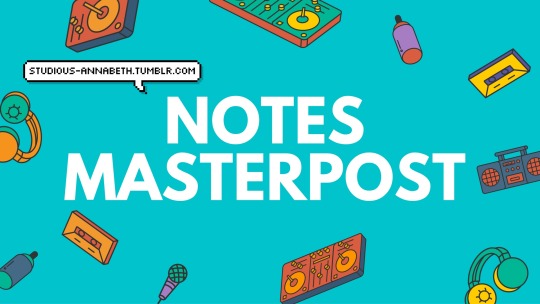
notes masterpost
Hi! OMG IM FINALLY DONE POSTING ALL MY NOTES HAHAH FINALLLYYYY!!!!
I understand it’s pretty hard to collate all my notes together, so I’ve made this masterpost!! :) + some abbreviation legend thing just in case you guys don’t understand the abbreviations i wrote hehe i hope you guys enjoyed these and that these notes helped!! thank you for sticking by me and my irregular posting schedules. Will continue to update this list when i post more notes in the future !!! xx

Biology Notes - based on Biology Matters for GCE ‘O’ Level (2nd Edition), by Marshall Cavendish
Chapter 2 - Cells
Chapter 3 - Movement of Substances
Chapter 4 - Nutrients
Chapter 5 - Enzymes
Chapter 6 - Nutrition in Humans
Chapter 7 - Nutrition in Plants
Chapter 8 - Transport in Humans
Chapter 9 - Transport in Plants
Chapter 10 - Respiration v1, v2
Chapter 11 - Excretion
Chapter 12 - Homeostasis
Chapter 13 - Nervous System
Chapter 14 - The Human Eye
Chapter 15 - Hormones
Chapter 16 - Cell Division v1, v2
Chapter 17 - Reproduction in Plants
Chapter 18 - Reproduction in Humans v1, v2
Chapter 19 - Heredity
Chapter 20 - Molecular Genetics
Chapter 21 - Ecology
Chapter 22 - Our Impact on the Ecosystem
Chemistry Notes - based on Chemistry Matters for GCE ‘O’ Level (2nd Edition), by Marshall Cavendish
Chapter 1-7
Chapter 8-14
Chapter 15-20
Chapter 21-24
6K notes
·
View notes
Photo
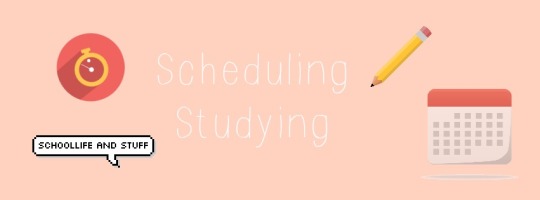
As you all know the secret to all memorization is revision. Revising can’t always be done the night before unfortunately, but has to be scheduled. Sometimes I find scheduling my studies quite hard, especially during stressful times. Here are some resources that can help you with scheduling your studies.
Making a study plan
Study plan lay out (1) (2) (3) (4)
Prepare for finals week video
Study plan by an oxbridge student
Study plan by a med student
Schedule your school calendar
Creating long term study plans
Study plan printable
Ways of planning
Bullet journal
Passion planner
Choose the right planner
Weekly
Daily
Monthly
To -do lists
Minimalist planning
Balancing social life and studying in your study plan
Finding time to study
Save time during the week
Organizing your life
Balancing school life and social life
Managing a heavy workload
Make the most out of your day
When you have a bad day
Useful apps/web resources for making a study plan
App plan
Google calendar
Calendars 5
Forest
Wunderlist
Momentum
Omnifocus
Study apps
Other productivity tips
14 productivity hacks
Time management
Due vs do dates
Stop procrastinating
5 minutes for a more productive day
How to focus when a million things seem to happen at the same time
Productivity masterpost
The 2 minute rule
Pomodoro method
5 tips for staying productive
A question about productivity
Stay productive when you are sick
8K notes
·
View notes
Photo





Daily Pastel Planner Printables
Comes in the 5 colours pictured above (peach, pink, lilac, blue, mint). There are two versions. One with times put out, perfect for a schedule and to-do combo. The other one is without time and works well for long to-do lists.
All of them comes with dues, goals, to-do, important tasks, notes and a food section!
Download from Google drive for free (PDF files):
Day with times (12h clock)
Day with times (24h clock)
Day without times
I have weekly pastel printables too which you can find here.
If you use them, tag me in the picture so I can see.
8K notes
·
View notes
Text
📚👓#RMBooks - Donating Books in Namjoon’s Name: “Books For Africa”

Hey guys~ So here is my 2nd Namjoon-related project!
Well, I thought since Namjoon loves books and reading so much and I guess he thinks that education is very important and everyone should be able to enjoy the great world of books, it would be nice to donate some Books in his name!
So I chose the charity programme “Books for Africa” Well, the title says it all, right? :D
Here’s the official website to this charity: http://www.booksforafrica.org/
You can read everything about it on this website :D
If you want to join you can donate money via paypal here to this acc: [email protected]
You can donate whatever amount you like! :D
NOTE: When we get to donate at least $50 we will get a note/certification from “Books For Africa”
I will donate in Namjoon’s name, so this certification will also hold HIS name :)
I think it would be a great gesture and present for Namjoon.
I woud say the deadline for donating is August 2017!
So we can donate a lot, do a good deed and give this certification to Namjoon for his Birthday (12 September!) next year! I think he will be very happy about that.
So as you can see there is a lot of time you guys have to donate, also it is YOUR CHOICE HOW MUCH you are willing/able to donate, so you don’t have to stress/worry about that^^

What do you guys think about that? Are you willing to participate in this project? Also, I hope you can share this project among the whole ARMY fandom and Namjoon stans
Thank you
P.S: Don’t hesitate to ask me when you have any questions~
475 notes
·
View notes
Text
you’re in your new apartment, comfortably cuddled in your extra big fuzzy blanket. your favourite, calming song is playing while you look out of the window, down on the city lights. next to you lies a great book eith a beautiful cover you’ve bought yesterday, together with a cute bookmark you’ve ordered online, and a cup of some hot beverage. you’ve been productive today, your assignments are challenging yet fun. tomorrow you’ll meet with some friends of yours at a little café you’ve just discovered. you doze off with a smile on your lips.
4K notes
·
View notes
Text
How to write a bomb ass personal statement
I’ve had a few asks about how to write - as one of you put it - a bomb ass personal statement. I’m a bit reluctant to write this, seeing as I haven’t actually got an interview/offer yet! But I guess it might be helpful to those of you applying around now :)
HOW TO START
Bullet point what you want to include - I suggest listing out what you want to include. It’s a good idea to do this at the beginning, to make sure you don’t leave anything out; and it can help form the basic structure of your statement.
Do not start at the start - this is one of the most important things I learnt when writing mine. It is so hard to write that first sentence - so just leave it until the end, and begin writing with the actual content, something you’re more comfortable writing about.
When you do get down to writing that first sentence - do not start with a cheesy quote or the typical “I have always bee passionate about…” as these are things that can immediately put off an admissions tutor. Try and be original, or just simple: “I want to study X because…”
THE CONTENT
Just keep writing - don’t worry about the 4,000 character and 47 line limits. Literally just write, and keep going, even if you think what you’re writing is bad - just get all your ideas out there, and put down everything you would want to include. It’s so much easier to take things out rather than adding things in. My personal statement was around 8,000 characters at one point!`
Get the balance right - different unis want different things from personal statements, so check their websites to make sure you’re getting in what they want. You need to get the balance of intellectual curiosity/passion for the subject with your personal qualities and extra-curriculars.
Back up everything with evidence - don’t just say you are great at working in a team, give examples that demonstrate that you have worked well in successful teams in the past.What to include?
WHAT TO INCLUDE
Why you want to study that particular course
Why you are the right person to study the course
Extra things you have done to show commitment or interest about the course - volunteering, subscriptions to journals, further reading etc.
Any relevant work experience
Any relevant awards you’ve won (e.g. maths challenge or physics olympiad) or responsibilities within the school (e.g. prefect or house captain)
Demonstrate desirable skills for your course - problem solving, teamwork, leadership etc.
WHAT NOT TO INCLUDE
Cliches - like “Ever since I was born I have wanted to study…”
Quotes - this is a personal statement, so don’t start quoting other people! Plus way too many people do this to make it original.
Jokes - it may be that the person reading your statement has a very different sense of humour than you do.
Really long sentences - you want your personal statement to be as easy as possible to read, and long confusing sentences won’t help that.
Repetition - it’s such a short document, you don’t have space for this. Plus it gets boring!
Names of unis - the unis you apply to have no idea where else you have applied, so don’t name any of them in your statement.
THE ENDING
Do not end on a cheesy quote or joke. Just sum up why you’d be a great candidate and reinforce what you have told them throughout the main body of the statement - that you’re fabulous!
Once you have finished a draft you can start trying to cut down on the word count. Maybe ask a teacher to look at your spelling/grammar, and you can always get your friends’ opinions too, on what should come out, and what should be kept in. Make sure you don’t let other people have too much influence - it has to be a personal statement!
9K notes
·
View notes
Photo

“To Kill a Mockingbird” by Harper Lee
“Pride and Prejudice” by Jane Austen
“The Diary of Anne Frank” by Anne Frank
“1984” by George Orwell
Harry Potter and the Sorcerer’s Stone" by J.K. Rowling
“The Lord of the Rings” (1-3) by J.R.R. Tolkien
“The Great Gatsby” by F. Scott Fitzgerald
“Charlotte’s Web” by E.B. White
“The Hobbit” by J.R.R. Tolkien
“Little Women” by Louisa May Alcott
“Fahrenheit 451” by Ray Bradbury
“Jane Eyre” by Charlotte Bronte
“Animal Farm” by George Orwell
“Gone with the Wind” by Margaret Mitchell
“The Catcher in the Rye” by J.D. Salinger
“The Book Thief” by Markus Zusak
“The Adventures of Huckleberry Finn” by Mark Twain
“The Hunger Games” by Suzanne Collins
“The Help” by Kathryn Stockett
“The Lion, the Witch, and the Wadrobe” by C.S. Lewis
“The Grapes of Wrath” by John Steinbeck
“The Lord of the Flies” by William Golding
“The Kite Runner” by Khaled Hosseini
“Night” by Elie Wiesel
“Hamlet” by William Shakespeare
“A Wrinkle in Time” by Madeleine L'Engle
“Of Mice and Men” by John Steinbeck
“A Tale of Two Cities” by Charles Dickens
“Romeo and Juliet” by William Shakespeare
“The Hitchhikers Guide to the Galaxy” by Douglas Adams
“The Secret Garden” by Frances Hodgson Burnett
“A Christmas Carol” by Charles Dickens
“The Little Prince” by Antoine de Saint-Exupéry
“Brave New World” by Aldous Huxley
“Harry Potter and the Deathly Hallows” by J.K. Rowling
“The Giver” by Lois Lowry
“The Handmaid’s Tale” by Margaret Atwood
“Where the Sidewalk Ends” by Shel Silverstein
“Wuthering Heights” Emily Bronte
“The Fault in Our Stars” by John Green
“Anne of Green Gables” by L.M. Montgomery
“The Adventures of Tom Sawyer” by Mark Twain
“Macbeth” by William Shakespeare
“The Girl with a Dragon Tattoo” by Stieg Larrson
“Frankenstein” by Mary Shelley
“The Holy Bible: King James Version”
“The Color Purple” by Alice Walker
“The Count of Monte Cristo” by Alexandre Dumas
“A Tree Grows in Brooklyn” by Betty Smith
“East of Eden” by John Steinbeck
“Alice in Wonderland” by Lewis Carroll
“In Cold Blood” by Truman Capote
“Catch-22” by Joseph Heller
“The Stand” by Stephen King
“Outlander” by Diana Gabaldon
“Harry Potter and the Prisoner of Azkaban” by J.K. Rowling
“Enders Game” by Orson Scott Card
“Anna Karenina” by Leo Tolstoy
“Watership Down” by Richard Adams
“Memoirs of a Geisha” by Arthur Golden
“Rebecca” by Daphne du Maurier
“A Game of Thrones” by George R.R. Martin
“Great Expectations” by Charles Dickens
“The Old Man and the Sea” by Ernest Hemingway
“The Adventures of Sherlock Holmes” (#3) by Arthur Conan Doyle
“Les Misérables” by Victor Hugo
“Harry Potter and the Half-Blood Prince” by J.K. Rowling
“Life of Pi” by Yann Martel
“The Scarlet Letter” by Nathaniel Hawthorne
“Celebrating Silence: Excerpts from Five Years of Weekly Knowledge” by Sri Sri Ravi Shankar
“The Chronicles of Narnia” by C.S. Lewis
“The Pillars of the Earth” by Ken Follett
“Catching Fire” by Suzanne Collins
“Charlie and the Chocolate Factory” by Roald Dahl
“Dracula” by Bram Stoker
“The Princess Bride” by William Goldman
“Water for Elephants” by Sara Gruen
“The Raven” by Edgar Allan Poe
“The Secret Life of Bees” by Sue Monk Kidd
“The Poisonwood Bible: A Novel” by Barbara Kingsolver
“One Hundred Years of Solitude” by Gabriel García Márquez
“The Time Traveler’s Wife” by Audrey Niffenegger
“The Odyssey” by Homer
“The Good Earth (House of Earth #1)” by Pearl S. Buck
“Mockingjay (Hunger Games #3)” by Suzanne Collins
“And Then There Were None” by Agatha Christie
“The Thorn Birds” by Colleen McCullough
“A Prayer for Owen Meany” by John Irving
“The Glass Castle” by Jeannette Walls
“The Immortal Life of Henrietta Lacks” by Rebecca Skloot
“Crime and Punishment” by Fyodor Dostoyevsky
“The Road” by Cormac McCarthy
“The Things They Carried” by Tim O'Brien
“Siddhartha” by Hermann Hesse
“Beloved” by Toni Morrison
“Slaughterhouse-Five” by Kurt Vonnegut
“Cutting For Stone” by Abraham Verghese
“The Phantom Tollbooth” by Norton Juster
“The Brothers Karamazov” by Fyodor Dostoyevsky
“The Story of My Life” by Helen Keller
66K notes
·
View notes
Photo

Writing a CV:
The perfect resume for someone with no experience (by businessinsider)
Guide to writing a CV
Common grammar mistakes to avoid on your CV
How to explain a gap in your CV
How to overcome common CV issues
What not to do on your CV
Should I include hobbies and interests in my CV?
CV layout: dos and don'ts
Free CV template
School leaver CV template
CV templates and tips
More free CV templates
Example CVs
How to tailor your CV to different industry sectors
Writing a Cover Letter:
How to write a cover letter
How to overcome common cover letter problems
Graduate cover letter template
Career break cover letter template
School leaver cover letter template
Free cover letter template
Referencing:
How to get a reference
References: workers’ rights
How to deal with employment references
How to include references on a resume
Interviews:
How to answer common interview questions
How to prepare for an interview
The interview itself
Advice to help you ace the interview
Answer curveball interview questions
101 Interview Questions You’ll Never Fear Again
Second interview questions and answers
Telephone interview questions and answers
Questions you should not be asked
What to wear to an interview: bloggers’ top tips
Group interview tips: do’s and don'ts
Interview questions for employers: What you should be asking
What not to do at interview
What job can I do?
How to decide what job to look for
How to find a new job
How to search for jobs online
Jobs in the retail industry
Jobs in the engineering industry
Jobs in the fashion industry
Jobs in the IT industry
Jobs in the motoring industry
Jobs in sport
Jobs in the education industry
Jobs in the energy industry
Careers with animals
Jobs in the media industry
Jobs in the leisure & tourism industry
Jobs in the catering industry
Jobs for history lovers
Jobs for geography lovers
Jobs for English lovers
Jobs for maths lovers
Volunteering:
7 Simple ways to make the best of volunteering
Benefits of volunteering
Benefits of mentoring
Volunteer Abroad
Resignation:
Resignation letters: What you need to know
Resignation letter templates
How to resign
How To Resign & Hand In Your Resignation Letter
Redundancy /Job Loss:
Deal with redundancy
Things to do if you lose your job
Claim Jobseeker’s Allowance
Jobseekers allowance (UK) overview
15 tips to survive a job loss
How to Cope With Job Loss and Move On
At work:
How to start a new job
How to have a good first day
How to hold onto your job
How to handle bullying in the workplace
Commuting: how far is too far?
How to get a promotion
Summer workwear advice
Office Style Trends 2015
What You Can (and Can’t) Wear to Work
Dealing with stress at work
How to deal with a brutal boss
44K notes
·
View notes
